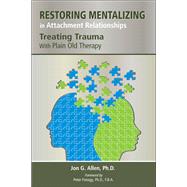Restoring Mentalizing in Attachment Relationships: Treating Trauma with Plain Old Therapy
, by Allen, Jon G., Ph.D.- ISBN: 9781585624188 | 1585624187
- Cover: Paperback
- Copyright: 7/1/2012
In Restoring Mentalizing in Attachment Relationships: Treating Trauma With Plain Old Therapy, the author argues that the incorporation of mentalizing into attachment theory and research provides a solid foundation for trauma treatment, and offers therapists and patients a pathway to recovery. In plain language accessible to clinicians and laypeople alike, Allen describes trauma in attachment relationships, reviews the literature, and makes a compelling, evidence-based argument for the efficacy of therapy. Specifically, the book: Presents a comprehensive view of attachment trauma across diverse diagnostic populations directly linking these to the psychotherapeutic interventions that work best. Allows therapists from different theoretical frameworks, by using these best practices, to treat patients with a wide range of problems and disorders. Situates mindfulness and mentalizing as central to secure attachment, focusing clinician attention on these most critical dimensions of healing relationships. Provides a thorough review of the research on attachment, mindfulness, and mentalizing, and evaluates the effectiveness of the most popular trauma treatments, which thereby equipping clinicians to treat patients across the spectrum of trauma-related psychiatric disorders. Employs a down-to-earth, conversational writing style that makes the book accessible to patients and family members as well as to professionals. Trauma can be the result of blatant events, such as violence, abuse, and neglect, or the subtle yet pervasive failure to connect. Both contribute to developmental psychopathology and cause lasting emotional pain. "Plain old therapy," according to Allen, is a valuable and proven resource for addressing trauma and treating patients with complex psychiatric disorders. This fascinating and eminently useful book should help to restore psychotherapy to its well-deserved stature.






